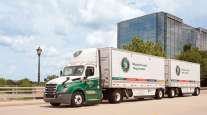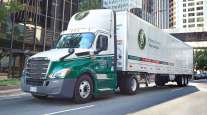Senior Reporter
Regulators Consider Up to One-Year Exemptions for ELD Integration Challenges

Federal trucking regulators are considering granting a one-year exemption from certain technical requirements of the electronic logging device mandate for carriers having difficulty integrating ELD software updates with their fleet managment systems.
The Federal Motor Carrier Safety Administration’s announcement, published Jan. 31 in the Federal Register, was prompted by a request from Old Dominion Freight Line Inc.
RELATED: Old Dominion Freight Line granted 90-day extension
YOUR GUIDE TO THE MANDATE: Downloadable PDF.
TALK ABOUT IT: On our Facebook page
ROLLOUT CREATES CHALLENGES: But compliance rising
The carrier is seeking a one-year exemption that would allow it to install devices running on older electronic logging software from PeopleNet in trucks added to its fleet for up to one year beyond the mandate’s Dec. 18, 2017, compliance deadline.
The ELD mandate includes a grandfather provision that allows fleets such as Old Dominion that had already installed automatic onboard recording devices, or AOBRDs — electronic logging systems that predate ELDs and do not fully comply with the ELD rule — to continue using them until December 2019. However, that provision does not apply to new vehicles that expand the size of a company’s fleet.
PeopleNet’s new ELD software does not have the means to integrate with Old Dominion’s fleet-management and safety systems.
FMCSA-doc by Transport Topics on Scribd
If FMCSA grants ODFL’s request, the extended phase-in period would give PeopleNet more time to develop the software needed to complete that integration.
FMCSA elected to extend the exemption request to other carriers as well.
“FMCSA considers the request to be on behalf of all motor carriers in similar situations concerning the integration of PeopleNet’s ELD software into fleet-management systems,” the agency’s announcement said.
Eric Witty, PeopleNet’s vice president of product management, said the software fixes may actually take less than a year to make.
“They’re just trying to make sure they don’t have to come back and ask for forgiveness,” he said in reference to the requested one-year timeframe.
Witty said that although it’s too early to be certain, he expects that other large fleets with PeopleNet systems may take advantage of a short- or long-term extension.
“There are definitely other carriers that have the challenge,” Witty added. “... If they’re planning on going at a pretty fast pace, then they might want the waiver and then they’ll be good to go.”
Witty also said he expects there are other ELD providers that will experience similar challenges.
“We suspect there are challenges all over,” he said. “We’re hearing things. But I don’t know what challenges others are having.”
At press time, Old Dominion’s ELD experts had heavy schedules that did not allow them time to do an interview, a spokeswoman said.
North Carolina-based Old Dominion, one of the largest less-than-truckload carriers in the country, operates a fleet of more than 8,500 power units and employs more than 10,000 commercial motor vehicle drivers.
PeopleNet is a supplier of electronic logging and fleet-management technology.
On Jan. 19, Old Dominion — as well as other motor carriers having issues transitioning to PeopleNet’s ELD software — were granted a 90-day waiver to add vehicles to their fleet using software that is not fully compliant with the ELD rule.
However, under the terms of that waiver, PeopleNet must make certain changes to the AOBRD software, including disabling the “skip feature,” limiting the auto-duty status change threshold to 5 miles and limiting geofencing of yard time to 0.5 miles.
“When these changes are fully implemented, and the operational controls are in place, the PeopleNet system used by Old Dominion will provide an equivalent level of safety while the integration of the ELD software is completed,” FMCSA said.
FMCSA will accept comments on the issue for 30 days past the Jan. 31 posting date of the exemption request in the Federal Register.





